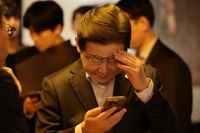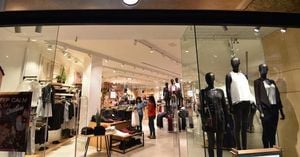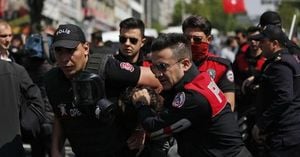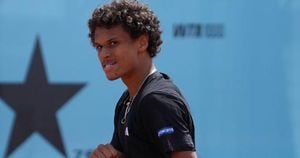The South Korean Supreme Court made a significant ruling on May 1, 2025, just 33 days before the presidential election, overturning a previous acquittal of Lee Jae-myung, the Democratic Party's candidate. This unexpected decision has created a stir in the political landscape, as it challenges the trajectory of Lee's campaign amid ongoing legal controversies.
In a rare move, the Supreme Court nullified a lower court's not guilty verdict regarding Lee's violation of the Public Official Election Act, sending the case back to the Seoul High Court for further proceedings. This swift action came only 36 days after the appellate court’s ruling, with 10 out of 12 justices supporting the decision.
"We overturn the original ruling and send the case back to the Seoul High Court," stated Chief Justice Cho Hee-dae, emphasizing the court's collective agreement on the matter. The Supreme Court found that Lee's statements regarding his golfing activities during a business trip with Kim Moon-ki in December 2021 were misleading. Lee had claimed that he did not play golf during the trip, which the court interpreted as a falsehood since he did engage in golfing while abroad.
Moreover, the Supreme Court addressed Lee's comments made during a National Assembly audit in October 2021, where he suggested that the Ministry of Land, Infrastructure and Transport pressured him to change land use in Baekhyeon-dong. The court ruled that this was a factual announcement rather than an exaggerated opinion, stating that the land use changes were made based on Seongnam City's independent judgment without external pressure.
As a result of this ruling, Lee is required to face a retrial at the Seoul High Court. If he receives a sentence of 1 million won or more, he would be barred from running in elections for five years, raising concerns about the future of his candidacy. Legal experts suggest that the chances of a not guilty verdict in the retrial are slim, especially given the Supreme Court's clear stance on the matter.
Despite the ruling, Lee remains active in his campaign. On the same day, he attended a meeting with non-traditional workers in Jongno-gu, Seoul, discussing their concerns and experiences. After the meeting, he commented on the Supreme Court's decision, expressing that it was a ruling in a direction he had not anticipated and reaffirming that the will of the public is paramount.
When pressed about calls for his resignation or the replacement of candidates, Lee stated, "Politics is ultimately what the people do, and I must follow the will of the people." His demeanor during the meeting was reportedly optimistic, as he engaged with workers without checking his phone, although he later appeared serious after reviewing the news of the court's decision.
Legal analysts indicate that the timeline for a final verdict before the June 3 election is highly unlikely. The Supreme Court does not have a record receipt notification process, which means that the Seoul High Court will need time to assign the case and schedule hearings. A lawyer familiar with the process noted that it typically takes several weeks to arrange the first hearing after the case is sent back.
If Lee were to win the presidency while his retrial is ongoing, it could lead to significant legal complications. The Constitution of South Korea stipulates that the president cannot be prosecuted during their term, except for cases of treason or foreign aggression. This raises questions about whether ongoing trials should be halted if he assumes office.
Experts are divided on how the privilege of non-prosecution would apply to Lee's existing legal challenges. Some argue that all trials should continue regardless of his election, while others contend that they should be suspended to ensure the president's stable governance.
Lee is currently facing multiple legal battles, including charges related to perjury and bribery in various cases. His upcoming court dates include a perjury appeal set for May 20, 2025, and other significant trials scheduled for May 13 and May 27, 2025.
As the election approaches, the political landscape remains fraught with uncertainty. Many in the legal community believe that the Supreme Court's recent decision reflects a return to stricter interpretations of election laws, which could have lasting implications for Lee's political future.
In light of these developments, the public's response to Lee's candidacy will be crucial. Some political analysts suggest that if voters choose to elect him despite the ongoing legal issues, it may signify a collective decision to prioritize democratic legitimacy over legal concerns. The upcoming election will not only determine Lee's fate but could also reshape the political landscape in South Korea.
![[속보]이재명 “생각과 전혀 다른 판결…결국 국민 뜻이 중요”](https://thumbor.evrimagaci.org/oCk4lnaFQq5NFhngXVpfVUcPCa4=/200x0/tpg%2Fsources%2F1f4b4069-783b-4e2d-8b79-6e5e7d295ae4.jpeg)




